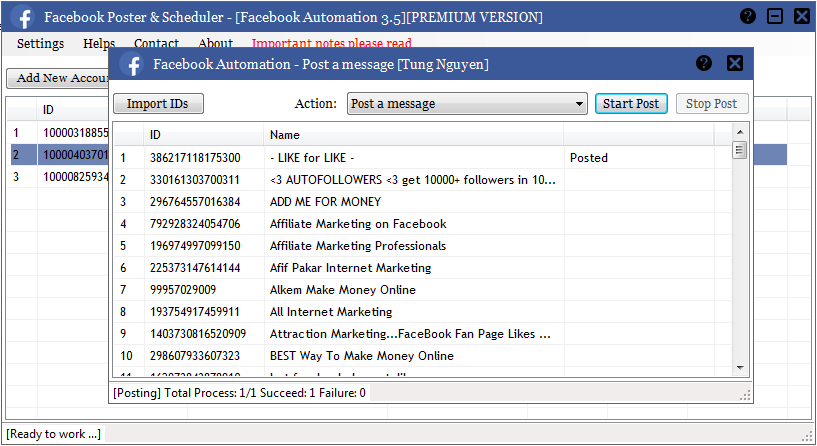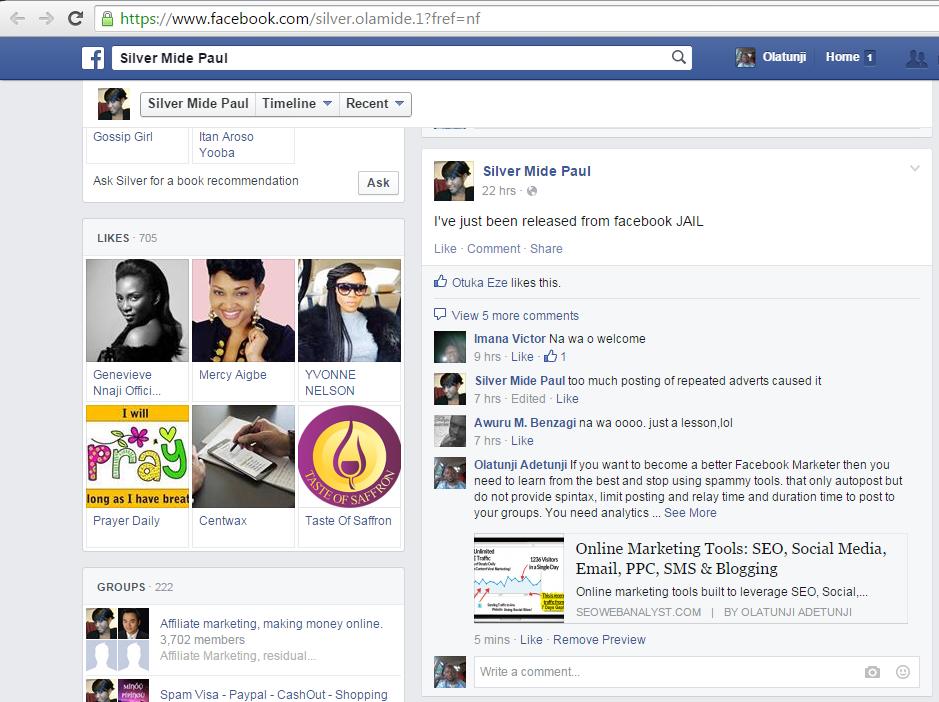![Why Bulk Automatic Facebook Group Poster is SPAM [Facebook Marketing Strategy].](https://seowebanalyst.com/blog/images/logo1.png)
![Why Bulk Automatic Facebook Group Poster is SPAM [Facebook Marketing Strategy].](https://seowebanalyst.com/blog/images/logo1.png)
2015-05-13 | 4654 ![]() Print
Print ![]() PDF
PDF
Its over a decade now since Facebook was founded back on February 4 2004, and since then it has grown to become the mammoth of all things social on the internet, it has a search engine function with Bing, a directory, a video, a gaming, an app, pictures, polls even shopping! Truly it deserves the magnitude of traffic it gains everyday with 500 million active users and 100 billion hits per day making Facebook Marketing strategy a must for most businesses online.

This has set a change in the way individuals and corporate organizations perceive social media sites, as one of the major medium to target their audience. However, one of the biggest issues that have always plagued the internet and other web marketing channels is "SPAM".
It started with email marketing, wildfire itself to search engine and caught up with social media site especially FACEBOOK.
For email marketing they are called spam mails, unsolicited emails that are sent from unknown senders, it is so rampant because in today's technology people really are not keen to build their own email list from the scratch by getting subscribers that are interested in a niche and saving them as safe list. Why? Because it cost money to generate quality email lists in their thousands. So they rely on buying closely related emails from web marketers that must have drain the juice out of their subscriber list and have rendered them unresponsive and solicit their email list as double option-in emails at low budget prices.
What would have taken an average of 6 months and hundreds of dollars to build gradually would now be thrown away at a pitching offer of a giveaway price. There is no way to validate if the emails are right for your niche but still they did not subscribe from you.
(I will be doing a bulk email-marketing strategy case study on open rate of email marketing from unsolicited email addresses to see if marketers do, gain success from buying emails that are not safe list( STAY TUNED).
The Email Marketing Campaign Success COMMON MISTAKES IGNORED (CASE STUDY) as been released, read for more insight [link open in new window].
Spam is so bad with email marketing because it is one of the cheapest ways to get awareness, despite the low open rate of emails (STAY TUNED FOR OUR CASE STUDY); we still have a handful of spammed emails that find their way into our inboxes. The only way to solve this is to mark such emails and addresses as spam and setup triggers for spam filters that will get them delivered into your junk or trash box in your email.
The Email Marketing Campaign Success COMMON MISTAKES IGNORED (CASE STUDY) as been released, read for more insight [link open in new window].
The same can be found on search engines marketing strategy (now known has Black Hat SEO). With the use of spammed contents ranking higher than valuable quality contents during the early days of search engines, with the use of link farms, excessive anchor text "exact keyword" link building, keyword stuffing (on-page optimization), duplicate contents and meta-tags etc all done just to get their website ranking, even if they do not correlate with the search phrase. But because the keyword has high volume of searches per day, Spammers will love to trick the search engines to rank their sites higher.
This was a big issue during the early years of Google and there has been positive strategy against such artist, which has cost Google into releasing several algorithm updates to easily blacklist such spam techniques.
Now it is the social age and everything and everyone is going social! It is the next zing thing on the internet and many spammers are already on it, trying to create shortcuts to channel traffic and web visits from the social sites to their urls.
So how do the social sites like Facebook combat such Spam techniques? First lets go back to when Facebook had a Facebook email function for every profile, then it was ultimately used as an email service you can receive messages on and also send messages to your fellow Facebook user, during this time Facebook group was not yet on the rising.
The spammers had a way of scrapping Facebook email users as one of their Facebook Marketing Strategy, just as they had a way to scrape any email from the web (even using search engines like Google, Yahoo, Bing, etc) to do it. They now set off with sending unsolicited marketing pitch to lots of Facebook audience, just as they would with email marketing spam, this lead to one of the reasons of the complete dissolution of Facebook emails in 2013. Facebook had to introduce the security privacy function that allows you to either make your registered email addresses visible to web visitors or not and then terminated the email messaging function. But it still serves the other purpose of receiving offline post messages from chats, when someone wants to message you and you are online it switch to chat, if you are not it switch to messages.
Now with this you will probably assume that Facebook anti-spam fight will be deadlock down! but you are wrong, there are other means of spamming Facebook and the most useful tool is the Facebook Share button (not the one you place on your site but the one located on every post you will find on Facebook) using the following mediums as bait;
When you do this you certainly are getting many attentions and your content are getting more views on the network. But the issue is this, you are actually spamming your own home feed, because every time you perform an action on Facebook all of your friends gets to hear about it, and if you decide to shut them out by blocking them, then how will your content get viral?
So the idea of mass posting to hundreds and thousands of Facebook groups do not make sense, it will naturally get your friends to unfriend you, because the only thing they will be seeing in their home feeds will be your 10000 s post messages to the 1000s groups your are a member of.

There is a limit or quantity of auto posting to a Facebook Group you can actually do in a day, previously when you exceed this number Facebook will prompt you to answer a recaptcha so as to proof you are human.
The idea was subsequently staled; but today there are technologies and platforms that allow you to do bulk automatic Facebook group posting. Some with their referral link attached to every post you publish via their platform (which in turns helps them in getting more massive unpaid for awareness depending on how often you use the platform) while others do not provide a link back to their platform address allowing your audience to focus more on your post.
Generally people are always looking for an easy way to doing things, automatically or on auto-pilot, what this does in effect is to get your profile curated with 1000 of similar contents...which is no fun to your Facebook friends who seems to always have to jump an hurdle of spam contents before getting to other friends content.
Ok you will decide to have a profile that has no friends and only post to groups. That could be a wise move but not a future planned one. Let s say you are setting up yourself as a brand/service provider or even a product in your niche and you get on Facebook Groups join as many as you can letís say 5000 Facebook Group limit and you tend to get traction from all your chaos, traffic flooding your site, ripping the benefits of bulk automatic Facebook group poster. You forgot something, and that is your followers (if you do not want to have friends) they will like to follow their brand and will you keep rejecting them? Alternatively, will you keep serving them 5000 similar post that sucks out the life out of their thumb when scrolling downing their screen?
One of the best ways to use automatic posting is to post at once and scheduling your post within every 1 hour. Then limit your bulk post to a 100 groups and schedule your next post within next 1 hour not 5 to 10 minutes, try a 30 to 60 minutes scheduling with a spin content or new fresh content, this will reduce the number of people you will get annoyed and will not make your post look spammed.
When you do this, Facebook will compile all the 100-post content into one and display only few group post, this is much better than posting your contents to several groups within a minute interval and letting them to be display individually on your news feed.
You can utilize social media marketing tools that can help you to manage your group contents and target the right time to post on each of the groups (the hour or time you get high engagement rate on a particular group), so even if you post similar content the time you post them for engagement will reduce spam rate.
Posting spin content is also a nice idea where by the content you post to all your groups will not be the same but would be similar. Using scheduling functions can also help to publish fresh contents to each post, targeting the right content that has high impact for each group via RSS Feeds, which you can still, spin and add your own links.
However, the best value you can get from any bulk automatic Facebook group poster is for you to be able to target the right group from your niche, so that when you start scheduling fresh contents and editing via RSS Feeds it be easier to target the groups because they all share similar interest by having something in common. This will give you leverage and maximize your traffic generation potential when adopting this type of Facebook marketing strategy.
This kind of functions and many other professional features are what a well-developed social management platform should look into and not just provide a one-way solution to automate the manual process of sharing contents on Facebook groups.

I am a seo web analyst and have a love for anything online marketing. Have been able to perform researches using the built up internet marketing tool; seo web analyst as a case study and will be using the web marketing tool (platform).
How To Fix GA4 Showing Wrong Domain Traffic
How To Reactivate Google Adsense Account
How Do You Write Pitch Deck That Wins Investors
Effective Lead Magnet Funnel Examples For Businesses
How To Promote FMCG Products Using Digital Marketing
The Main Objectives Of SEO in Digital Marketing
How Artificial Intelligence Is Transforming Digital Marketing
Google CEO Sundar Pichai: Search will profoundly change in 2025
3 Most Important Business Growth Strategies
Top 20 Work From Home Job Skills